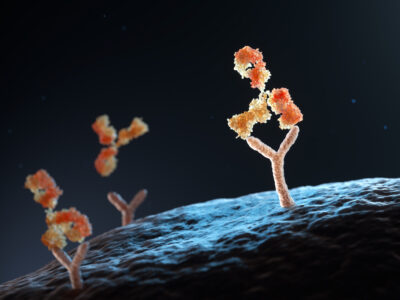Table of Contents[Hide][Show]
Virus variants…
They’ve become a central focus in every media outlet, and the headlines are pretty alarming.
But here’s the truth:
You’ve been dealing with viruses and all their various changes and mutations your whole life.
They’re the reason you’ll get dozens of colds over your lifetime, and why the CDC recommends a new flu shot every year.
To survive, viruses must mutate and change frequently. This is how they’re able to escape detection by your immune system. And each time they change, your body has to learn to identify and properly address the new versions.
Thankfully, with a little insight into how your immune system works – and what you can do to support its optimal strength – you’ll be able to successfully navigate the ever changing viral landscape.
How Viruses Try To Outsmart Your Immune System
“The only constant in life is change…” That’s true of everything, including viruses.
To spread, a virus needs to infect a host and replicate (producing lots of copies of itself.) When this replication takes place, the virus doesn’t always manage to produce an exact copy of itself. This constant, imperfect iteration is what creates new variants. Some of those variants will disappear without even a blip, while others survive for the long haul.
Some changes make a virus more infectious, and some can make it less infectious. And of course, some iterations make the virus spread more easily, so more people can catch it. There are other ways that viruses can change, but all the mutations have something in common: Their number one objective is to evade your immune system and make you sick.
Thankfully, no matter what kind of virus variant crosses your path, a healthy immune system will catch on and figure out how to properly eliminate it. Here’s how that works:
When your immune system first identifies an antigen (any invading microbe like a toxin, pathogen, or virus,) a well-functioning body will immediately get to work creating battle plans, organizing troops, and devising an attack.
Amongst your immune troops, you have a special division of first responders known as antibodies. These special, Y-shaped proteins are designed to identify threats, tag them for quicker identification in the future, and then move quickly to neutralize and show antigens the door.
Your antibodies, commonly referred to as your immunoglobulins, collect information about any threat and deliver comprehensive antibody reports to your immune system so your body can figure out how to defeat them.
Your ability to easily and quickly produce a steady supply of immunoglobulins is a crucial part of you staying healthy. And as you might suspect, the more immunoglobulins your body has available, the quicker your body can plan and mount an effective response.
Unfortunately, some types of virus variants have figured out how to make things extremely difficult…
How Viruses Drift and Shift (And Why That Makes Things Difficult)
There are two basic ways that viruses can mutate: through processes known as drift and shift.
Antigenic DRIFT refers to a viral mutation that brings about very small, gradual changes. This is typically facilitated via the alteration of proteins on the viral surface. At first, the changes brought on via antigenic drift are so minute that the mutated virus closely resembles the original virus. As a result, your immune system has no problems recognizing it as a threat and easily fighting it off.
Over time, though, all of those tiny changes add up. This causes the virus mutations to “drift” further and further away from the original. Compounding mutations eventually result in a significant enough antigenic drift that makes things harder on your immune system. Initially, it may not be able to immediately recognize the new variant and neutralize it. Variants created through antigenic drift are the reason you can get sick from colds and flu every year (but can also recover fairly quickly.)
The second mutation—known as antigenic SHIFT—creates sudden and considerable changes in an existing virus. What that means is these variants will be unrecognizable to your immune system, resulting in slower identification (and therefore delayed battle plan creation.) And while this type of mutation is much less common, it has the potential to make many more people sick.
Here’s the main point to understand from both antigenic drift and shift:
Regardless of the variation type, the way to address them properly starts with having healthy support from your immunoglobulin team.
The Not-so-secret Weapon That Helps Your Immune System Respond to Variants
Whenever your immune system senses any kind of threat, it quickly responds by sending in immunoglobulin troops to meet the invaders head on. Your body produces different types of immunoglobulins, but one particular variety, known as immunoglobulin G (or “IgG” for short,) is the most important and plentiful of your antibody soldiers.
IgG antibodies are all designed to have a basic “Y” shape. This particular structure helps them latch onto antigens sort of like a lock and key. While the right key would result in perfect match, even an imperfect fit can effectively bind to an antigen and capture it.
Once in its grasp, your IgG soldiers then attempt to neutralize and tag the antigen so your immune system can better recognize and properly deal with it.
This “imperfect lock and key” system works even when IgG comes across a novel or unknown variant. This is good news because it means your immune system will still see the “threat” tag even if it’s not completely sure how to handle the threat. Once identified, your immune system then sends out special cells called macrophages that consume anything that’s been tagged by the antibodies. That’s not a misnomer; your macrophages literally eat the cells of the attacking antigens.
As your macrophages work their magic, other immune cells huddle up to learn everything they can about this new variant. Their objective? To create a perfect match lock and key antibody that can immediately neutralize the antigen next time it knocks on your door.
Of course, this effective, multi-pronged strategy would fail before it even starts without a healthy supply of IgG.
Related
3 Common Health Issues You Had No Idea Were Gut-Related
Explore three common issues that may turn out to be gut-related and that could actually be helped by be balancing your microbiome.
The Critical Link Between IgG And Your Gut Barrier
Your immune system – and therefore your overall health and wellness – depend heavily on IgG antibodies, which make up around 80% of the germ-fighting cells in your body. They patrol constantly, trying to capture invading antigens before they can make you sick. And whether it’s a threat they’ve encountered before or a new virus variant, your IgG team will fight its hardest.
IgG also plays a key role in strengthening one of your body’s most important defense mechanisms: your gut barrier.
Your intestines are lined by a layer of cells (known as your gut barrier) that acts like a blockade between your gut and your bloodstream. Its main job is to determine who gets access to your bloodstream, and who gets turned away. This is how important players like nutrients, antioxidants, and other healthy compounds are allowed bloodstream access, while nefarious characters like viruses, bacteria, and toxins get denied.
Unfortunately, thanks to our modern world full of poor diets, environmental toxins, and stress, antigens can quickly grow in numbers and prey on your gut barrier… Weakening it and making it vulnerable.
As your gut protection falters, it results in things like a leaky gut. (Leaky gut is a condition where viruses and pathogens – which are normally kept locked safe inside your gut – are able to escape and enter the bloodstream, causing severe health problems.)
Luckily, IgG helps protect and repair the gut barrier, keeping this amazing defense system strong and effective.
With so many critical immune functions relying on IgG antibodies, you can see how boosting your body’s primary protectors could benefit your health. Studies show that one of the best ways to support a healthy immune response is by adding a particular supplemental version of IgG to your health regimen. This approach has been shown to help:
- Reinforce your antigen defense system
- Support proper immune function
- Manage a healthy inflammatory response
- Maintain a strong and healthy the gut barrier
How To Choose The Right IgG Supplement
While it’s great news that we can support our body’s immunoglobulins through supplementation, choosing the right one can be challenging.
IgG can be formulated a couple different ways, so there’s one thing you need to watch out for…
Most IgG supplements are made from milk, which can cause an unfavorable, low-grade inflammatory response in the body. This is, of course, the last thing you want if you’re trying to support your immune system!
A helpful IgG product should be lactose-free so your body can tolerate it with ease. That’s why many health experts recommend IgG supplements that are 100% derived from bovine serum.
>> Learn more about our preferred IgG supplement
Conscientiously extracting immunoglobulins from serum ensures the product is free of lactose, casein, and β-lactoglobulin (the most abundant whey protein in milk.)In this way, you get a fresh supply of IgG to support an immune system that responds properly: Smart, balanced, and most importantly, effective.
You May Also Like…





